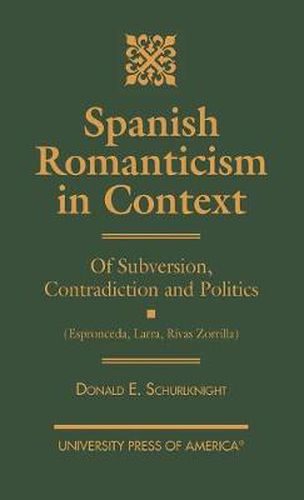Readings Newsletter
Become a Readings Member to make your shopping experience even easier.
Sign in or sign up for free!
You’re not far away from qualifying for FREE standard shipping within Australia
You’ve qualified for FREE standard shipping within Australia
The cart is loading…






This book investigates the elements of contradiction, subversion and ambiguity inhabiting major works of Espronceda, Larra, Rivas and Zorrilla and reveals the politics of their literature through an examination of the cultural context. The book presents Zorrilla’s Don Juan Tenorio and Rivas’ Don Alvaro as replications of cultural codes in evolution and conflict. The essay on Don Juan Tenorio considers a number of the play’s inconsistencies, contradictions and lacunae and explores its popularity as the product of a political agenda. This new interpretation of Don Alvaro permits the reader to see both Rivas and his drama in light of cultural context: a society established on paradoxical, conflicting codes of behavior. Although both plays are frequently considered hallmarks of Romanticism, these analyses reveal a politics of conservative shadings in liberal disguise. Two essays on Larra locating him in his cultural context and an exploration of irony as the instrument of subversion in Espronceda’s El estudiante de Salamanca complete the work. The focus throughout the book is on subversion and contradiction, both intentional and accidental, as the results of literary production in unstable cultural and political contexts.
$9.00 standard shipping within Australia
FREE standard shipping within Australia for orders over $100.00
Express & International shipping calculated at checkout
This book investigates the elements of contradiction, subversion and ambiguity inhabiting major works of Espronceda, Larra, Rivas and Zorrilla and reveals the politics of their literature through an examination of the cultural context. The book presents Zorrilla’s Don Juan Tenorio and Rivas’ Don Alvaro as replications of cultural codes in evolution and conflict. The essay on Don Juan Tenorio considers a number of the play’s inconsistencies, contradictions and lacunae and explores its popularity as the product of a political agenda. This new interpretation of Don Alvaro permits the reader to see both Rivas and his drama in light of cultural context: a society established on paradoxical, conflicting codes of behavior. Although both plays are frequently considered hallmarks of Romanticism, these analyses reveal a politics of conservative shadings in liberal disguise. Two essays on Larra locating him in his cultural context and an exploration of irony as the instrument of subversion in Espronceda’s El estudiante de Salamanca complete the work. The focus throughout the book is on subversion and contradiction, both intentional and accidental, as the results of literary production in unstable cultural and political contexts.